

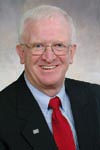 We
just finished an interesting academic year, meeting our goals through many accomplishments.
We successfully completed the first year of our e-Scholar program. In August
of 2002, more than 1,300 freshmen received laptops, a historic first for UW-Stout
and the UW System. Our surveys of freshmen indicate a high rate of approval
for the program. Faculty really stepped up and adapted their courses and teaching
styles to this new tool. In my opinion, we will see significant changes as the
program continues. In three years, UW-Stout will be a campus where every undergraduate
student will have a laptop. Everyone can be extremely proud of the great strides
made by the many dedicated faculty, academic staff and support staff.
We
just finished an interesting academic year, meeting our goals through many accomplishments.
We successfully completed the first year of our e-Scholar program. In August
of 2002, more than 1,300 freshmen received laptops, a historic first for UW-Stout
and the UW System. Our surveys of freshmen indicate a high rate of approval
for the program. Faculty really stepped up and adapted their courses and teaching
styles to this new tool. In my opinion, we will see significant changes as the
program continues. In three years, UW-Stout will be a campus where every undergraduate
student will have a laptop. Everyone can be extremely proud of the great strides
made by the many dedicated faculty, academic staff and support staff.
As the only university to be awarded the Malcolm Baldrige National Quality Award,
UW-Stout also remains at the center of the quality movement for education, nationally
and internationally. We have made well over 100 presentations, and spoken to
more than 11,000 people about the positive impact this program has for higher
education.
Still, we experienced such accomplishments while dealing with the worst fiscal
crisis in the history of Wisconsin and the UW System. The budget cuts we were
required to make (a 25 percent base cut to the UW System) were indeed
difficult. Fortunately, the state has permitted tuition to increase $250 a semester,
so that we could manage the cut in a way that preserved the core mission of
instruction. Clearly, the historic social compact between the states and public
higher education that has always guaranteed high access at affordable rates
is changing rapidly. This trend, I think, will have very negative consequences
in the long run.
This 2002–03 annual report represents the range of activities we are involved
in daily. It focuses on our seven strategic goals—for these drive our
agenda, provide clarity in vision and mission, and reflect our core values.
We invite you to not only read the report, but to respond to it with questions,
suggestions or comments. We want and need your involvement. If we are to remain
the School of Choice for the 21st Century, we must provide the programs and
services our stakeholders require.
Charles W. Sorensen
Chancellor
To reflect UW-Stout’s commitment to align campus initiatives with its mission and values, this annual report is organized around the university’s five-year strategic goals.
The rollout of the e-Scholar program at the beginning of the fall semester forever transformed UW-Stout. As more than 1,300 freshmen received laptops with wireless capabilities, the university wrote another chapter in its history by becoming the first public digital university in Wisconsin. As a result, e-Scholar students will spend their entire college career linked to their academic programs, their instructors and to each other through digital technologies.
Ninety-five percent of freshman students surveyed prior to the program's launch [1] had a positive reaction toward becoming an e-Scholar. Individual students reported that they regard the laptops as:
As students logged on to the university's wireless network, they discovered a new e-Scholar portal. This easy-to-use Web site brings together and personalizes all the information students need to enhance their learning experience, making their laptops even more efficient tools.
All over campus, students access the portal to:
Currently, the university is also developing an advisement section for the portal. This feature will guarantee that both advising faculty and students seeking guidance will have access to the same information, including program plans, degree audits, test results and course sequencing.
The e-Scholar portal was selected by the Association of College and University Telecommunications Professionals, a national organization, as the "Site to See."
Together, a wireless infrastructure, laptops and the e-Scholar portal are transforming how learning occurs at UW-Stout by extending the scope of the traditional four-walled classroom to every lounge and green space on campus, and beyond.
UW-Stout instructors have been working together to transform their courses and how they teach to accommodate the new technologies. Surveyed instructors reported that they use the laptops [2] to:
Likewise, e-Scholar freshmen reported that they use their laptops more than
they expected to take notes and gather research. (Digital Learning, Figure 1)
In addition, they reported using their laptops outside of class [3]
as an organizational tool; for schoolwork, e-mail and personal entertainment;
and to keep up with campus events.
UW-Stout is evaluating the long-term impact of the e-Scholar program on active learning, critical thinking and teaching. The four key evaluation themes [4] are learning and performance; engagement; expectation and satisfaction; and teaching and instructional practice. Current results [5] indicate that, during their first year, students participated in a multitude of in-class and out-of-class activities that enhanced their learning. (Digital Learning, Figure 2)
Additionally, an analysis of courses dropped and failed during the fall semester [6] suggests the program is already having a positive effect on student engagement. Students dropped or failed approximately 340 fewer credit hours than in the previous two years. Because students will not have to take these credits over, their potential tuition savings total more than $50,000.
To ensure e-Scholar students receive reliable, consistent technical support, UW-Stout established a walk-up help desk where laptops can be brought for immediate repairs. Configuration problems, software conflicts and malfunctioning machines are serviced in less than an hour.
If a laptop is in need of further repairs, the student's hard drive is removed and installed into a loaner machine in less than a half hour.
As a result of feedback from students [7] and the rapid pace of changing technology, approximately 2,000 incoming students in the fall of 2003 received laptops that are more robust than the ones students received at the fall 2002 rollout. Both the new Compaq and Apple models possess:
Additional changes for the second year of the e-Scholar program include:
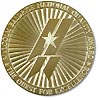 As
the first university to receive the Malcolm Baldrige National Quality Award,
UW-Stout has taken a national leadership role in higher education through its
Center for Assessment and Continuous Improvement. This center manages requests
from a variety of organizations that want to learn more about the benefits of
the Baldrige model. The center's 13 quality consultants provide these organizations
with the knowledge, skills and tools essential for designing and implementing
a continuous improvement program.
As
the first university to receive the Malcolm Baldrige National Quality Award,
UW-Stout has taken a national leadership role in higher education through its
Center for Assessment and Continuous Improvement. This center manages requests
from a variety of organizations that want to learn more about the benefits of
the Baldrige model. The center's 13 quality consultants provide these organizations
with the knowledge, skills and tools essential for designing and implementing
a continuous improvement program.
UW-Stout developed two new professional development certificate programs designed for individuals who want to enhance their personal growth and professional advancement by obtaining new skills.
A campus assessment coordinator is refining the way UW-Stout measures student learning in academic programs; deploying a new model to assess general education; and evaluating how assessment is conducted campuswide.
Through an evaluation of the university's customary academic program assessments, the following opportunities for improvement were identified:
The expected outcomes of these improvements are:
UW-Stout's General Education Committee developed a new assessment model for general education. The committee refined assessment topics and shortened the reporting cycle to meet those suggested by the Academic Quality Improvement Program.
Also, responsibility for general education assessment will seamlessly shift from the Program Review Committee to the General Education Committee, which will adopt the AQIP model.
 During
spring break, sixteen students and two staff members traveled to France for
a 10-day tour of such sights as the Louvre and Notre Dame. The Go-More Program's
experience in France was funded by a College Completion Grant through Student
Support Services-ASPIRE and Disability Services. UW-Stout students who have
a disability, or demonstrate financial need according to federal financial aid
guidelines, or are the first in their family to pursue a bachelor's degree,
were chosen to participate in this global experience.
During
spring break, sixteen students and two staff members traveled to France for
a 10-day tour of such sights as the Louvre and Notre Dame. The Go-More Program's
experience in France was funded by a College Completion Grant through Student
Support Services-ASPIRE and Disability Services. UW-Stout students who have
a disability, or demonstrate financial need according to federal financial aid
guidelines, or are the first in their family to pursue a bachelor's degree,
were chosen to participate in this global experience.
While in France, the students attended French history lectures to prepare them to tour a number of historic sites. They received one academic credit for the transdisciplinary experience, which goes toward fulfilling UW-Stout's global perspective requirement.
Six UW-Stout students also studied in France during the fall semester as part of the new Abbey Program. Located in a 1,000-year-old abbey in the Loire Valley, this program brings nearly 100 students from all over the United States together for a semester to take courses and explore French culture. As part of the Abbey Program's inaugural year, four UW-Stout students received $1,000 scholarships to cover the cost of their international experience.
The UW-Stout Teaching and Learning Center completed its second year of operation with a number of activities. The center:
 UW-Stout
graduates are experiencing a slow economy, diminished by the dot com bust; the
September 11, 2001 terrorist attacks; and the unraveling of several big corporations.
As a result, UW-Stout's employment rate dropped slightly but still remains solid.
UW-Stout
graduates are experiencing a slow economy, diminished by the dot com bust; the
September 11, 2001 terrorist attacks; and the unraveling of several big corporations.
As a result, UW-Stout's employment rate dropped slightly but still remains solid.
More than 2,200 students participated in, and 217 employers registered for, the university's 2002 three-day career conference. In addition, more employers are hiring UW-Stout students as co-op/interns than ever before.
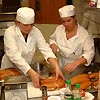 Twenty-two
students in UW-Stout's summer Quantity Food Production course, their instructor
and four teaching assistants served more than 25,000 fans daily at the weeklong
2002 U.S. Senior Open Championship in Baltimore. Working under contract with
Prom Management Group Inc., a Minnesota-based catering service, the students
cooked and served upscale breakfasts, fancy lunches and late afternoon hors
d'oeuvres to guests in more than 40 corporate hospitality tents.
Twenty-two
students in UW-Stout's summer Quantity Food Production course, their instructor
and four teaching assistants served more than 25,000 fans daily at the weeklong
2002 U.S. Senior Open Championship in Baltimore. Working under contract with
Prom Management Group Inc., a Minnesota-based catering service, the students
cooked and served upscale breakfasts, fancy lunches and late afternoon hors
d'oeuvres to guests in more than 40 corporate hospitality tents.
To prepare for the golf championship, the students strengthened their commercial
food production, management, service, sanitation and food safety skills by planning,
preparing and offering five meals to the public at "Corner III," a
restaurant laboratory in UW-Stout's Home Economics Building.
Thanks to a UW-Stout instructor and two students, hundreds of youth exhibitors
lodging at the Tommy G. Thompson Youth Center ate better food during the State
Fair. In collaboration with Milwaukee Area Technical Colleges, the Private Industry
Council of Milwaukee County and the State Fair Park, they planned new menus,
balancing nutritional value with recipes that appeal to youngsters.
The UW-Stout students also worked as on-site managers at the youth center during
the State Fair, supervising more than 41 inner city Milwaukee high school students.
PIC chose the high school students based on their interest in food service management
as a career, and MATC provided culinary arts training to them.
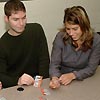 Students
in UW-Stout's packaging program gained real-life experience as they worked with
Rayovac to design new packaging for the company's hearing aid batteries. Changes
in the packaging of the company's competitors led Rayovac to seek new ideas
in order to maintain their dominant market share.
Students
in UW-Stout's packaging program gained real-life experience as they worked with
Rayovac to design new packaging for the company's hearing aid batteries. Changes
in the packaging of the company's competitors led Rayovac to seek new ideas
in order to maintain their dominant market share.
The company asked the three student groups to produce a new design that works
for different battery sizes, protects the batteries from losing their strength
and increases the value of the product without increasing the cost.
After conducting research, the groups drew their designs using Computer Aided
Design and created prototypes using rapid prototyping equipment. They presented
their final prototypes to nine executives at Rayovac's Corporate Headquarters
in Madison. The company reported that they plan to adopt several of the students'
concepts.
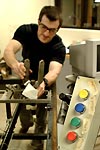 For
their senior-level Capstone experience, students in UW-Stout's manufacturing
engineering program built custom automated machines for Toro, a lawn care device
company, and QA1, manufacturers of after-market suspension components.
For
their senior-level Capstone experience, students in UW-Stout's manufacturing
engineering program built custom automated machines for Toro, a lawn care device
company, and QA1, manufacturers of after-market suspension components.
The Toro student engineering team designed and fabricated a semi-automated cell
that transports a variety of similar shaped parts of different sizes to a robotic
welder, separating the operator of the machine from the actual welding. The
QA1 team designed and built an automated assembly that inserts rubber bushings
into automotive shocks, eliminating the need for a full-time worker to insert
the bushings manually.
To design and build the custom cells, both teams researched their clients' needs,
justified costs, stayed within the companies' specified budgets and ordered
materials. The two teams presented their finished prototypes to UW-Stout instructors,
administrators and company representatives. Toro and QA1 actually plan to put
the teams' prototypes into production.
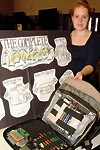 Students
in UW-Stout's exploring technology course developed and exhibited more than
200 inventions that solve problems by enhancing human abilities. The students
either built working models of their inventions or constructed prototypes.
Students
in UW-Stout's exploring technology course developed and exhibited more than
200 inventions that solve problems by enhancing human abilities. The students
either built working models of their inventions or constructed prototypes.
As part of the course, the students thoroughly researched and wrote about the
technologies and scientific concepts related to their inventions. This helped
them understand the theories behind their ideas, even if they do not have the
technical know-how to literally produce them. Many of the students also created
a company concept related to their inventions, complete with missions and marketing
strategies.
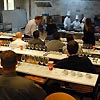 Students
in UW-Stout's hospitality and tourism program learned about the wine, food and
cultural aspects of major wine producing countries through three-week wine and
food pairing courses offered in Australia and Spain.
Students
in UW-Stout's hospitality and tourism program learned about the wine, food and
cultural aspects of major wine producing countries through three-week wine and
food pairing courses offered in Australia and Spain.
During their travels, the students developed an applied approach to matching
Australian and Spanish wine and food using complementing flavors, textures and
components. The courses also emphasized menu planning, food preparation and
cooking methods. In both countries, the students ended the course by preparing
four five-course meals, serving complementary wines.
The Australia course was taught in August at Southern Cross University in Coffs Harbor. Students started their wine and food pairing experience in Sydney, and then toured vineyards and wineries in the Hunter Valley.
Afterward, the students matched Australian wines, including Shiraz, Semillion,
Chambourcin and Verdelho, with food available in the local markets. In doing
so, they consumed exotic dishes, such as kangaroo, alligator, ostrich, caviar
and wild duck.
In January, the Spain course was taught at the University of the Balearic Islands in Majorca. Students took vineyard and winery tours in Sherry and Seville on the mainland, including the Gonzalez Byass winery famous for excellent sherries. They also explored the island wines and foods of Majorca.
The students then interacted with UIB students during a three-day tasting session of Spanish and American wines and food. They ate and matched foods, such as Paella, Tapas, wild boar, lamb, elk and swordfish, with Spanish wines, including Tempranillo, Garnacha, Mazuelo, Macabeo, Parellada and Cava.
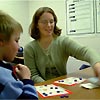 UW-Stout
students worked to improve the reading skills of area elementary school children
through the America Reads Challenge, a Federal Work Study program. The eleven
students tutored children in reading and language arts skills at the seven regional
elementary schools.
UW-Stout
students worked to improve the reading skills of area elementary school children
through the America Reads Challenge, a Federal Work Study program. The eleven
students tutored children in reading and language arts skills at the seven regional
elementary schools.
The students worked on a variety of projects with children who range in age
from preschoolers to fifth graders. Some of the tutors assisted English as a
Second Language students. Several participated in one-to-one tutoring. Others
implemented a special reading program purchased by one of the schools.
As elementary schools become more and more strapped for resources, this program
allows them to provide individual services to children who otherwise may not
get additional attention. In addition, the program helped UW-Stout meet its
requirement to use Federal Work Study funds for community service programs.
The majority of the tutors were early childhood education majors who are required
to take three reading and language arts courses during their college career.
Other student majors included art education, and family and consumer sciences
education.
UW-Stout biology students helped high school students from the area Lucas Charter
School study the ecology of the local Gilbert Creek. Under the direction of
the Dunn County Land Conservation Office, the university students taught the
Lucas students how to measure stream depth, width and water speed.
The Lucas students also had the opportunity to learn how to calculate velocity
and flow, measure dissolved oxygen, and identify bugs they collected from the
creek bottom.
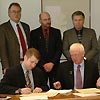 UW-Stout's
Center for Innovation and Development partnered with UW-Extension's statewide
Small Business Development Center network to provide a wider range of business
development services to regional entrepreneurs. The partnership is critical
during the state's fiscal crisis, providing a method for economic recovery by
cultivating a positive climate for new products and technologies.
UW-Stout's
Center for Innovation and Development partnered with UW-Extension's statewide
Small Business Development Center network to provide a wider range of business
development services to regional entrepreneurs. The partnership is critical
during the state's fiscal crisis, providing a method for economic recovery by
cultivating a positive climate for new products and technologies.
SBDC counselors work with a wide variety of entrepreneurs to develop sound business plans, obtain financing and acquire basic management skills. The SBDC specialty center at UW-Whitewater expands these services to new product and invention assessments and market expansion feasibility studies. UW-Stout's CID provides the next step — actual product engineering and design, prototype development and product evaluation.
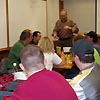 UW-Stout's
Northwest Wisconsin Manufacturing Outreach Center promotes the competitiveness,
strength, productivity, growth and innovative capabilities of more than 2,000
small- to medium-sized manufacturers in Northwest Wisconsin. NWMOC is a direct
partnership between UW-Stout and the following five technical colleges: Chippewa
Valley, Nicolet Area, Northcentral, Western Wisconsin and Wisconsin Indianhead.
UW-Stout's
Northwest Wisconsin Manufacturing Outreach Center promotes the competitiveness,
strength, productivity, growth and innovative capabilities of more than 2,000
small- to medium-sized manufacturers in Northwest Wisconsin. NWMOC is a direct
partnership between UW-Stout and the following five technical colleges: Chippewa
Valley, Nicolet Area, Northcentral, Western Wisconsin and Wisconsin Indianhead.
As a nonprofit center within the Stout Technology Transfer Institute, NWMOC meets a wide range of business needs through the expertise of its staff; access to instructors at UW-Stout and the technical colleges; and the resources of a consultant network. This range of expertise helps manufacturers apply modern tools and strategies in order to:
Since it was formed, NWMOC has provided approximately 2,700 technical assistance activities to more than 900 companies; sponsored 296 educational events for 3,280 people from 2,012 companies; helped to create or retain 1,807 jobs; and achieved client-reported impacts of more than $110 million.
For example, the center recently connected Phillips Plastics Corporation to university expertise that saved the company approximately $150,000 in lost revenue from shipping damage. An instructor and a student from UW-Stout's packaging program conducted research and introduced a packaging material to the company that reduces shipping damage to an insulin pen case. The new material also cost less, was less harmful to the environment and required less packing labor.
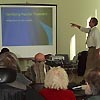 A
series of conferences organized by the Stout Vocational Rehabilitation Institute
introduced new quality-of-life enhancing technologies to more than 900 persons
with disabilities from across the state. In conjunction with the Division of
Vocational Rehabilitation and the Wisconsin Independent Living Centers, SVRI
conducted 10 assistive technology conferences.
A
series of conferences organized by the Stout Vocational Rehabilitation Institute
introduced new quality-of-life enhancing technologies to more than 900 persons
with disabilities from across the state. In conjunction with the Division of
Vocational Rehabilitation and the Wisconsin Independent Living Centers, SVRI
conducted 10 assistive technology conferences.
Individuals with disabilities attended a variety of conference sessions created to enable them to boost their abilities, including:
SVRI staff and service providers from around Wisconsin provided the presentations. Vendors of assistive technology, ranging from accessible van rental to computer adaptation services, also set up demonstration tables at the conferences.
The DVR funded conferences in La Crosse, Hayward, Milwaukee, Madison, West Bend, Eau Claire, Wausau and Green Bay. The Great Lakes Inter-Tribal Council and Lac Courte Oreilles Band of Lake Superior Chippewa funded two of the conferences, held on the Lac Courte Oreilles and Lac du Flambeau reservations, with gaming revenue.
UW-Stout strongly encourages faculty and staff to conduct research and scholarly activities related to the university's academic programs. As a result, the research enterprise at UW-Stout continues to remain strong.
Ten UW-Stout faculty members were awarded sabbaticals during the 2002-03 academic year to enhance their teaching and research efforts. (Goal 3, Figure 2)
Faculty on leave for one semester:
Faculty awarded full academic year sabbaticals:
A series of monthly presentations, Tech-talk Business Briefs, introduced regional employers to the campus and the area community. Sponsored by Stout Solutions and the Stout Technology Park, the hour-long presentations by business leaders encouraged discussions about innovations in business and industry, regional technical support needs, and research and training opportunities.
Workforce development, technical assistance and training providers; business owners and supporters; city and county officials; and chamber of commerce and economic development professionals were encouraged to attend the free talks. During the spring semester, Tech-talk Business Briefs covered a wide range of topics.
UW-Stout launched the Food Packaging and Technology Center to assist businesses in the four-state region with all aspects of food product development and food packaging. The FPTC is a research and development, training and consulting center that offers the food industry the following services:
The FPTC combines the expertise of students and instructors in UW-Stout's art, food systems and technology, dietetics and nutrition programs. As part of the Stout Technology Transfer Institute, the FPTC will generate projects and revenue that offer the following benefits to UW-Stout:
The center has already worked on projects with such regional companies as Appleton Inc. and Northstar Bison, and has agreed to work with several new companies during the next year.
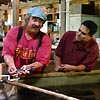 A
UW-Stout researcher from the food and nutrition department helped the local
Bullfrog Fish Farm transform its byproducts into high-quality fish feed. Finding
a way to benefit from the nutritional value of approximately 10,000 pounds of
fish processing byproducts was essential to the farm's plans for future growth.
A
UW-Stout researcher from the food and nutrition department helped the local
Bullfrog Fish Farm transform its byproducts into high-quality fish feed. Finding
a way to benefit from the nutritional value of approximately 10,000 pounds of
fish processing byproducts was essential to the farm's plans for future growth.
The UW-Stout researcher developed a process to use Bullfrog Fish Farm's fish processing byproducts to manufacture high-quality fish meal, a primary ingredient in trout feed, right on the farm. This new process converted the farm's largest waste of resources into a significant reduction of purchased feed, its second largest production cost. The solution addressed a number of other issues, such as nutrition, cost, disease, water quality, labor and storage.
The researcher and students also worked with Cady Cheese Factory to find ways the business can benefit from whey produced by its cheese production process. The researchers worked to develop potential food products that take advantage of the whey's high mineral content, including a sports beverage, beer and snack food.
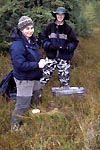 A
UW-Stout research team made up of a biology instructor, a post-doctorate teaching
scholar and several students, studied peat bog bacteria that slow global warming
by eating methane, a potent greenhouse gas.
A
UW-Stout research team made up of a biology instructor, a post-doctorate teaching
scholar and several students, studied peat bog bacteria that slow global warming
by eating methane, a potent greenhouse gas.
The bacteria studied by the team convert methane into carbon dioxide, a greenhouse gas that is much less potent, but still important in global warming. The team hopes that a better understanding of this process may someday lead to the control of methane production.
Supported by a National Science Foundation CAREER grant, the research team is currently developing new ways to identify the methane-eating bacteria. To do this, they conduct field research in peat bogs in Bena, Minn., and in the Trout Lake Station in Wisconsin's Vilas County. Up to their knees in water and peat, they study the bacteria's habitat and take core samples that they later analyze in the laboratory.
The researchers are comparing the core samples taken from the two different sites, which are strikingly different. The peat bog in Minnesota is nutrient poor and contains very few plant species, while the Wisconsin site provides more nutrients and is home to a much larger variety of plants.
As the result of collaboration between UW-Stout, Marshall Erdman & Associates, and Vilnius Gediminas Technical University, a student from Lithuania attended a semester of courses in UW-Stout's construction program. The VGTU student also participated in an eight-month cooperative education experience with ME&A through UW-Stout's Placement and Co-op Services Office.
ME&A provided $24,000 to cover the Lithuanian student's expenses. Approximately 50 percent of the funds formed a scholarship through the Stout University Foundation. The remainder covered the student's wages and living expenses during the co-op experience.
UW-Stout will use the study abroad agreement it developed with VGTU as a model contract for all future partnerships with international universities, including a possible business administration exchange with VGTU.
UW-Stout was recognized for diversity achievements by the Wisconsin Department of Employee Relations and the State Council on Affirmative Action. The university was granted the Secretary's Award of Achievement, a new category, for progress in attracting women and minorities into faculty positions, and for a broad variety of diversity initiatives.
The Secretary's Award recognizes praiseworthy human resource practices in attracting and retaining minority and women employees. Due to the campuswide goal to recruit and retain a diverse population, UW-Stout implemented initiatives that created the following positive results:
(Goal 4, Figures 1 and 2)
UW-Stout has made a commitment to encourage a respectful diverse community by adopting Plan 2008, a strategic plan for diversity. As the first phase of this plan ended, the majority of the 67 programs included in the plan met or exceeded their expected outcomes. Measures of progress in 2002-03 included the following:
UW-Stout again received the Governor's Special Minority Business Award for
purchasing activity with Wisconsin certified minority vendors. The university's
purchases from minority vendors increased to 9 percent during the 2002 fiscal
year, surpassing the Department of Administration's 5 percent goal. The university
made $796,747 in purchases from such minority vendors as the Blackhawk Company
and Vanguard Computers, exceeding the previous years total by more than $200,000.
(Goal 4, Figure 3)
With enhanced recruitment efforts, the official enrollment at UW-Stout continues to rise as the average freshman profile improves.
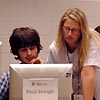 The
WebFair Summer Institute brought 24 high school students from around Wisconsin
to UW-Stout for advanced instruction in Web page design. This institute grew
out of the annual statewide Wisconsin WebFair competition.
The
WebFair Summer Institute brought 24 high school students from around Wisconsin
to UW-Stout for advanced instruction in Web page design. This institute grew
out of the annual statewide Wisconsin WebFair competition.
During WebFair, Wisconsin students from kindergarten through college enter their Web page designs to have them judged. High School students who enter the competition are invited to the summer institute. The Nakatani Center for Learning Technologies has sponsored the WebFair institute as part of its mission to support programs that improve education with technology.
The institute provided students a variety of Web development experiences, including:
In addition, UW-Stout received a grant from the Stout University Foundation to facilitate extracurricular Wisconsin Web Weavers clubs in high schools across the state. Eventually, the WebFair Summer Institute will be a place for the WWW clubs to get together to network.
Spurred by UW System's one-year evaluation of university life for women, UW-Stout initiated an Equality for Women Initiative to examine and improve all aspects of university life related to the status of women students, staff, faculty and administrators. The initiative addresses a variety of women's issues, including hiring, promotion and retention of women employees; educational opportunities for women students; learning and work environment; and balancing work and personal life.
As measures of progress in 2002-03 toward the goals of the initiative, UW-Stout:
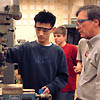 Hundreds
of high school students from Wisconsin and Minnesota attended two separate Engineering
and Technology Career Days at UW-Stout. The one-day events were designed for
high school students interested in engineering and technology-related careers,
and their teachers.
Hundreds
of high school students from Wisconsin and Minnesota attended two separate Engineering
and Technology Career Days at UW-Stout. The one-day events were designed for
high school students interested in engineering and technology-related careers,
and their teachers.
The events offered students breakout sessions featuring the following areas: engineering technology, manufacturing engineering, packaging, construction, telecommunication systems, applied mathematics and computer science, applied science, and graphic communications management. The sessions introduced students to UW-Stout's academic programs in these areas and provided them hands-on projects in state-of-the-art laboratories.
In addition, panels made up of employers and alumni enabled students to interact with people employed in the engineering and technology fields, as well as graduates of the related programs.
A new mentoring program is available for all new and transferring employees at UW-Stout. The Classified Staff Mentoring Program provides a "welcome" to individuals new to the Menomonie community, the campus or a department. The program links an established classified member of the UW-Stout community to the employee, providing an opportunity to gain valuable insight into the inner working of the university. The benefits of participating in the program include:
The program also provides mentoring training, learning opportunities, community contacts and Web site mentoring resources.
In response to recommendations made by UW-Stout's Equality for Women Initiative, the university launched a new women's mentoring program available to all academic staff members. This mentoring program is in addition to an already existing mentoring program for faculty. The UW-Stout Women's Mentoring Program for Academic Staff is designed to offer opportunities for:
The program promotes these opportunities through one-to-one activities between mentors and mentees, group activities and informal get-togethers, and by making resources available electronically.
In response to recent crisis situations, from residence hall bomb threats to FBI warnings about terrorist threats, UW-Stout's Crisis Management Planning Council fine-tuned the university's crisis recovery plan.
The original plan was created in 1993 to ensure the safety and security of people and facilities during a crisis, and to get the campus back to normal operating procedures as soon as possible.
The council streamlined the Crisis Management Team according to the operational guidelines of the Federal Emergency Management Agency. FEMA recommends that one person lead a group of four people, representing four categories: operations, planning, logistics and finance.
This structure allows the university to have more people out on the campus doing what they do best, instead of sequestered in a meeting. The core group knows enough about the campus to make quick, encompassing decisions. The planning council also changed portions of the main crisis recovery plan, including the procedures for dealing with the most common threats.
The Crisis Management Team took part in a crisis recovery tabletop exercise with members of the Dunn County Emergency Management Office and the Wisconsin Emergency Management Office. The group was given a scenario and asked to plan a strategy according to the four FEMA categories.
Because a major disaster on campus would also likely affect the city and county,
UW-Stout employees frequently train with the local fire department, police department
and emergency management office. Currently, a Dunn County representative sits
on the university's planning council, while the campus is represented at the
Dunn County Emergency Operations Center.
Over the last year, the university and the Menomonie-area community made significant progress-working together to change the local alcohol and other drug use environment. The Chancellor's Coalition Addressing Problem Drinking has been a catalyst for discussion and training; improved and coordinated programming; and changes to policies, laws and enforcement strategies. The following are a few key activities conducted in the past year:
A new exterior signage project was completed for the campus. The comprehensive signing enhances the university's identity, replacing 20-year-old redwood signs.
 An
aggressive schedule was established to replace the aging Jeter, Tainter and
Callahan residence halls on North campus, with new housing for junior- and senior-level
students. The campus worked closely with architects to design a modern suite-type
residence hall that can accommodate approximately 300 students. Construction
is scheduled to begin in January 2004.
An
aggressive schedule was established to replace the aging Jeter, Tainter and
Callahan residence halls on North campus, with new housing for junior- and senior-level
students. The campus worked closely with architects to design a modern suite-type
residence hall that can accommodate approximately 300 students. Construction
is scheduled to begin in January 2004.
The Optimal Health Committee supports healthy lifestyles by providing UW-Stout employees with opportunities to increase their health awareness. Approximately 300 staff and students attended the committee's annual Optimal Health Fair to view health-related exhibits; eat chocolate; try out fitness equipment; and receive massages, hearing tests and blood pressure tests.
Other initiatives sponsored by the committee included:
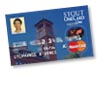 To
complement its digital environment, UW-Stout partnered with Higher One, a financial
services firm, to implement a new campus card system that makes business transactions
more convenient and expands online services.
To
complement its digital environment, UW-Stout partnered with Higher One, a financial
services firm, to implement a new campus card system that makes business transactions
more convenient and expands online services.
The system allows students and employees to complete transactions anywhere, anytime. Cardholders can choose to use their OneCard as a primary bank account, allowing them to get cash from ATMs, write checks, send and receive money electronically from their accounts, and monitor the details of their accounts on an interactive Web site.
The service also makes it possible for students to receive financial aid refunds
electronically to their card account, eliminating the production of 11,000 checks
annually. Student employees may also receive their payroll checks electronically.
These digital solutions resulted in increased efficiency and cost savings for
the university.
In celebration of Earth Day, the UW-Stout grounds department began a four-year test project using corn gluten meal as an organic weed reducer. An application of a granulated form of corn gluten was applied to several areas on campus as an organic method of controlling weeds in lawns, shrubs and garden areas.
To reduce the use of chemicals on campus, the following practices were also initiated:
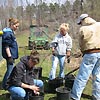 The
UW-Stout grounds department and four students in a biology course undertook
a project to rid the small, diverse wetland on the south side of campus of the
invasive purple loosestrife plant. In conjunction with the Wisconsin Department
of Natural Resources, the group raised several thousand Galerucella beetles,
natural enemies of purple loosestrife.
The
UW-Stout grounds department and four students in a biology course undertook
a project to rid the small, diverse wetland on the south side of campus of the
invasive purple loosestrife plant. In conjunction with the Wisconsin Department
of Natural Resources, the group raised several thousand Galerucella beetles,
natural enemies of purple loosestrife.
The students dug loosestrife roots from the wetland, potted them and raised the plants in a makeshift wetland. After receiving 100 beetles from the DNR, the group placed the bugs on the plants, covered them with netting and left them to multiply to one hundred times their original population.
Some of the Galerucella beetles the group raised were set loose in the university's loosestrife infested wetland. The rest were given to the DNR to be used in other state wetlands.
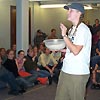 Fresh
Success, a first-year-student residential program at UW-Stout, continues to
help freshmen transition to college life by providing a highly social and dynamic
setting. The programs and activities sponsored by Fresh Success residence hall
staff are designed to help students get to know one another quickly, and to
help make UW-Stout feel like home to them. In addition, the staff helps freshmen
work through specific transition issues, such as homesickness, achieving autonomy
and budgeting.
Fresh
Success, a first-year-student residential program at UW-Stout, continues to
help freshmen transition to college life by providing a highly social and dynamic
setting. The programs and activities sponsored by Fresh Success residence hall
staff are designed to help students get to know one another quickly, and to
help make UW-Stout feel like home to them. In addition, the staff helps freshmen
work through specific transition issues, such as homesickness, achieving autonomy
and budgeting.
The fall 2002 expansion of the Fresh Success program to a second residence hall increased participation from 480 freshmen to more than 600. Approximately 50 percent of all freshmen now live in a Fresh Success residence hall.
In addition, Fresh Success's fifth year was marked by the following program enhancements that targeted academic success:
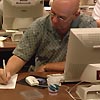 UW-Stout
WebCamps and a new e-Scholar course delivery tool have helped many instructors
develop online courses or enhance traditional courses by posting resources on
the Web.
UW-Stout
WebCamps and a new e-Scholar course delivery tool have helped many instructors
develop online courses or enhance traditional courses by posting resources on
the Web.
At this year's Extreme WebCamp, 25 instructors with advanced computer skills gained a full command of Blackboard course development software. The extreme campers participated in a WebCamp Blackboard course as students and created their own Blackboard courses as instructors.
Two other WebCamps piloted the new e-Scholar course delivery tool developed by UW-Stout staff. This unique tool was created to:
The two WebCamp pilot groups were instrumental in improving the e-Scholar course delivery tool to meet the specific needs of UW-Stout instructors. During the January 2003 camp, 27 WebCampers plus 6 "control group" participants who piloted the tool generated an amazing 171 Web-enhanced courses, making Web resources available to nearly 2,300 students.
UW-Stout also offered an additional 599 Blackboard courses during the spring 2003 semester, totaling 770 Web-enhanced or online courses.
In keeping with the university's digital environment, UW-Stout redesigned its Web site, making it more dynamic, and easier to use, maintain and alter. The new site features:
UW-Stout's own Web Site Usability Testing Center provided usability consulting for the new design. The center helped determine whether external audiences, such as prospective students, parents, business partners and other visitors who are unfamiliar with UW-Stout, could find the information they want on the new site. Their findings were incorporated into the new design.
 The
Stout University Foundation is a vigorous organization that plays a key role
in positioning UW-Stout as a leader in higher education. The foundation's rapid
growth directly relates to the loyal friends and alumni who recognize the importance
of supporting UW-Stout and its talented faculty, staff and students.
The
Stout University Foundation is a vigorous organization that plays a key role
in positioning UW-Stout as a leader in higher education. The foundation's rapid
growth directly relates to the loyal friends and alumni who recognize the importance
of supporting UW-Stout and its talented faculty, staff and students.
The foundation has the largest endowment of the UW System comprehensive campuses, providing support for laboratory equipment, student scholarships, library resources, faculty grants and an expanded student emergency loan fund.
The foundation also leads the UW comprehensives with seven endowed professorships (Goal 7, Figure 1), two endowed chairs and grants awarded to the university for diversity initiatives.
Donations to the foundation during the recent fiscal year totaled more than $1.8 million, which is positive considering the downturn in the United State's economy.
In 2002-03, the Stout University Foundation awarded $467,000 in scholarships to 380 students. These awards ranged from $500 to $6,000. The foundation also established 12 new endowed scholarships and 18 new annual scholarships in 2002-03.
To improve interaction within their profession, a group of alumni, instructors and students from UW-Stout's interior design program developed the Interior Design Connections Web site. The IDC offers a way for past, present and future students of the program to communicate with each other, and provides an educational tool to help them stay current with innovations in the industry.
The IDC Web site also:
Digital Learning | Figure 1

Source: Training and Expectation Survey, Fall 2002 and Student Questionnaire Survey 1, Fall 2002.
Digital Learning | Figure 2

Source: Learning Effectiveness Survey, Spring 2003
Goal 3 | Figure 1
| Academic Year | Submitted | Awarded |
| 1997-1998 | 188 | 124 |
| 1998-1999 | 176 | 117 |
| 1999-2000 | 215 | 143 |
| 2000-2001 | 236 | 172 |
| 2001-2002 | 227 | 204 |
Source: Stout Solutions • Research Services; does not
include gifts of money.
Goal 3 | Figure 2
| 2000-01 | 2001-02 | 2002-03 | |
| UW-Stout | 10 Rank #4 |
10 Rank #5 |
10 Rank #4 |
| Campus 1 | 17 | 12 | 10 |
| Campus 2 | 10 | 13 | 19 |
| Campus 3 | 11 | 14 | 12 |
| Campus 4 | 6 | 6 | 8 |
| Campus 5 | 15 | 15 | 13 |
| Campus 6 | 5 | 5 | 3 |
| Campus 7 | 5 | 5 | 6 |
| Campus 8 | 5 | 4 | 3 |
| Campus 9 | 1 | 3 | 4 |
| Campus 10 | 8 | 5 | 5 |
Source: Board of Regents Minutes
Goal 4 | Figure 1
| Average
Pool Size |
Average
Women in Pool |
Average
Minority in Pool |
|
| 2000-01 | 17 | 7 | 1 |
| 2001-02 | 27 | 12 | 2 |
Source: Applicant Tracking Database, Equal Opportunity/Affirmative Action Office
Goal 4 | Figure 2
| Average
Pool Size |
Average
Women in Pool |
Average
Minority in Pool |
|
| 2000-01 | 21 | 7 | 3 |
| 2001-02 | 26 | 7 | 4 |
Source: Applicant Tracking Database, Equal Opportunity/Affirmative Action Office
Goal 4 | Figure 3
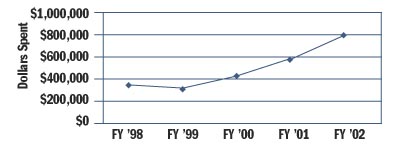
Source: UW-Stout Purchasing Services
Goal 4 | Figure 4
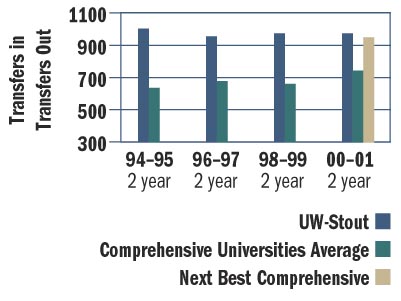
Source: UW System Student Statistics
Goal 7 | Figure 1
| 2000 (1999-2000) |
2001 (2000-01) |
2002 (2001-02) |
|
| UW-Stout | 7 (min. $250,000) |
7 (min. $250,000) |
7 |
| Campus 1 | 6 (min. $50,000) |
7 | 4 |
| Campus 6 | 5 (min. $150,000) |
4 | 4 |
| Campus 5 | 3 (min. $350,000) |
3 (min. $250,000) |
3 |
| Campus 7 | 2 (min. $50,000) |
n/a | 2 ($1 million) |
| Campus 2 | 1 | 0 | |
| Campus 10 | 0 | 0 | 0 |
| Campus 3 | 0 | 2 | 1* ($36,000) |
| Campus 4 | 0 | n/a | |
| Campus 9 | 0 | 0 | 0 |
| Campus 8 | n/a | 0 | 2 ($500,000) |
Source: Campuses 1-10; includes number of professorships and minimum endowment for each; * these professorships are not foundation-funded.
Published for the Chancellor's Office by the Office of University
Relations
with assistance from the Office of Budget, Planning and Analysis.